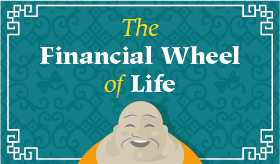Almost 60% of Americans have more emergency savings than credit card debt.
Each week, Consolidated Credit searches for financial research that can help you deal with your debt and budget. This week…
The interesting study
The financial experts at Bankrate regularly conduct surveys as part of the Financial Security Index. The latest survey focused on emergency savings and credit card debt. Bankrate surveyed over 1,000 adults by phone from February 7-11, 2018.
The big result

The banner headline from the survey depends on how you frame it. Bankrate and other publications like Madison.com took a positive spin: Most Americans now have enough money in savings to pay off their credit card debt. The survey found that almost 6 in 10 Americans (58%) had “right size emergency savings.” That’s when you have enough money set aside to pay off all your revolving debt.
However, MarketWatch took a much gloomier perspective on the same survey data. They point out that one in five Americans (21%) don’t have enough savings to cover their debt.
The fascinating details
In case you’re wondering, the other 12% surveyed said they had no credit card debt. Unfortunately, they also said they had no emergency savings either. So, this is basically the breakeven group.
The good news is that more people have right size emergency savings compared to two years ago. When Bankrate conducted the same survey in 2015, just over half of respondents (52%) had right size savings. In addition, most Americans are focused on paying down debt, increasing savings or both.
- 53% place the higher priority on building emergency savings
- 40% are focused on paying off debt
- 3% are doing both at the same time
Interestingly enough, where your focus lies may depend on your age. Millennials tended to focus on saving, while Gen X and Boomers focused more heavily on paying down debt.
What you can do
“Your financial life should never be focused on just one thing,” argues April Lewis-Parks, Financial Education Director for Consolidated Credit. “If you’re just focused on paying off debt and you don’t save, every emergency expense will throw you off course. So, a truly balanced budget doesn’t just focus on one thing. It does all things at once.”
Infographic
Your Financial Wheel of Life
Consolidated Credit financial wheel of life helps you strike the right balance by teaching you to balance money management, debt elimination and savings….
Read moreIn a balanced budget:
- You save 5-10% of the income you bring home each month
- Credit card debt minimum payment requirements should take up no more than 10% of your income
“You should be able to save and pay off debt at the same time,” Lewis-Parks explains. “This gives you the right emergency savings to cover those unexpected expenses that always seem to pop up. You basically start to treat savings like a bill you pay yourself. This ensures you save consistently. Then, if you have extra cash left in your budget, you can direct it to paying off more debt.”
What is right size emergency savings?
In the way that Bankrate is using it, right size emergency savings refers to having enough money in savings to pay off all your credit card debt. It basically means you could break even, if need be. But is that really right size emergency savings?
“Emergency savings is meant to protect you against unforeseen financial circumstances,” Lewis-Parks clarifies. “Although you could use it to pay off debt, it’s real purpose is to cover emergencies and unexpected expenses. That could be anything from your water heater breaking or a transmission repair for your vehicle, to being temporarily unable to work due to unemployment or a medical emergency.”
Experts recommend that right size emergency savings should really cover 3-5 months of budgeted expenses. So, if you spend $1,500 each month, your emergency savings should ideally be $4,500 to $7,500. That allows you to live for up to five months without any need to rely on credit cards or other short-term debts like payday loans.
Want more tips for saving money effectively? Visit Consolidated Credit’s Saving Guide. If you need to pay off debt, talk to a certified credit counselor now.
